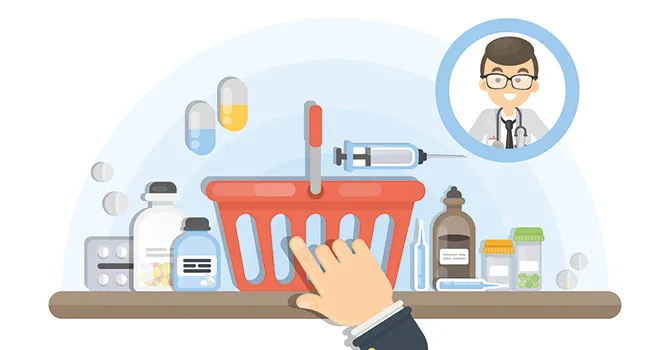Amazon’s healthcare vision is becoming increasingly clear. Simon-Kucher’s consumer healthcare experts Christian Rebholz and Christian Ring-Knudsen discuss how pharmaceutical manufacturers can create a strategy for handling Amazon’s expected presence as an online pharmacy in Europe.
Amazon is known as the ultimate disruptor. First launched as an online bookshop over 25 years ago, the retail giant has since branched out its business into a wide range of industries, including brick and mortar grocery stores and streaming subscription services. Attention around the globe is on what industry Amazon will disrupt next, and now the focus has turned toward healthcare.
Amazon has already kicked off its campaign to disrupt the pharmacy sector in the US, starting with over-the-counter (OTC) medicines. In 2017, it launched its private label, Basic Care, consisting of over 60 products from medical hair treatments to painkillers. The “budget” brand has captured considerable market shares which is not at all surprising. This is a company renowned for its successful consumer-centric focus. Now the consensus is that the European pharmacy market will be next, which ultimately creates numerous opportunities and risks for European pharmacies and manufacturers.
Amazon’s silent but smart OTC strategy
To better understand how Amazon has successfully made its first bold steps into online pharmaceuticals, it is important to understand the backdrop of the US healthcare market. Remember that Amazon did not decide to go immediately “all-in”. Instead, it started quietly by allowing pharmacies and manufacturers to sell their products via its ecommerce platform Amazon Marketplace. Pharmacies increased their reach and manufacturers benefited from cutting out the middlemen, along with the independence to set their own prices, while Amazon took an acceptable percentage in fees. This made consumers increasingly familiarized with buying OTC products in the Amazon environment, and allowed Amazon a smooth transition to sell its own private label OTC products.
Again, Amazon made little noise when it launched Basic Care, its exclusive line manufactured by Perrigo, which covers a wide range of OTC products for categories such as pain, digestive, and cough & cold. Without much promotion or media coverage, Basic Care products started to appear on the marketplace, strategically advertised alongside the well-known brands. With the Marketplace having already captured the customer relationship, Amazon were in the perfect position to redirect traffic.
There are still many unknowns about Amazon's pursuit into the OTC space. What we do know is that Amazon is investing heavily and signs of rapid growth are already present. And Amazon is capable of operating at a loss for a certain amount of time – they have already perfected this strategy in several other industries. First enter the market aggressively and attempt to gain market share as fast as possible with very low prices. Then, once they have secured significant market share, they increase margins by demanding lower prices from the manufacturers.
Should OTC manufacturers in Europe sell via Amazon?
There is little doubt that Amazon also has big plans for the OTC market in Europe. Just like in the US, consumers are shifting toward the online channel. It is less a question of if and more about when and how Amazon moves in. However, companies can use the case of the US to prepare for Amazon’s entry into the European OTC space. Here are 5 key considerations for pharmacies and pharmaceutical manufacturers:
- Working with Amazon is a balancing act
There is great volume potential, but margins are at risk. Amazon will likely enter the European OTC market with a clear goal of trying to get market shares as quickly as possible. To do this Amazon is expected to lower prices at first to get consumers on board.
- Amazon seeks a full product basket
At the beginning of each new market, whatever the industry, Amazon’s rule seems to be selection, selection, selection. The company wants to offer the full range of products because that is the only way to ensure they are always considered by consumers.
- Amazon doesn’t always increase “the size of the pie”
There may be some industries where Amazon has grown the total size of the market. However, experience with US market is that consumers mostly move from offline to online, then online to Amazon. The decreasing relevance of the offline market should be considered in cost planning, with greater investment in online marketing.
- Private label captures a lot of volume
It’s highly likely that Amazon will launch a private label when it enters the market. Manufacturers with a private label partnership will initially experience a positive volume impact. However, they must carefully consider the strategic implications surrounding potential brand decay in other channels.
- Success lies in being preferred choice
At the beginning of a partnership with Amazon, every company should ask how they can position themselves to become the “Choice” label. Tests show that Amazon Alexa is more likely to recommend Amazon Choice products, so this label is becoming increasingly important for manufacturers as more consumers use the assistant to order their products. However, Amazon Choice listing is not something that can be bought. It is the result of a comprehensive and successful ecommerce strategy.
There are both opportunities and risks for European pharmacies and manufacturers that partner with Amazon. Therefore, before engaging in a partnership with Amazon, pharmacies and manufacturers should carefully consider other possibilities such as:
- Investing to build strong consumer brands that shoppers will demand pro-actively
- Ignoring Amazon to partner closely with other online pharmacies
- Investing heavily in online visibility/reach
- Using the increasing data availability to better understand and target consumers
Don’t underestimate Amazon as a healthcare player
Amazon is already testing the waters in other healthcare markets. In 2018 it acquired PillPack, an online pharmacy startup that packages medicine and delivers it directly to patients. This move provided pharmacy wholesale licenses in almost all US states, which is the launch pad Amazon needs to start directly shipping prescription medicines to consumers.
Any company that thinks of Amazon as “just retailer” needs to think again. Over the course of its existence, the company has continuously expanded its business model. The healthcare business has always been an interesting target. There is major potential to create a better customer experience across healthcare as a whole, and this is what Amazon does best.







